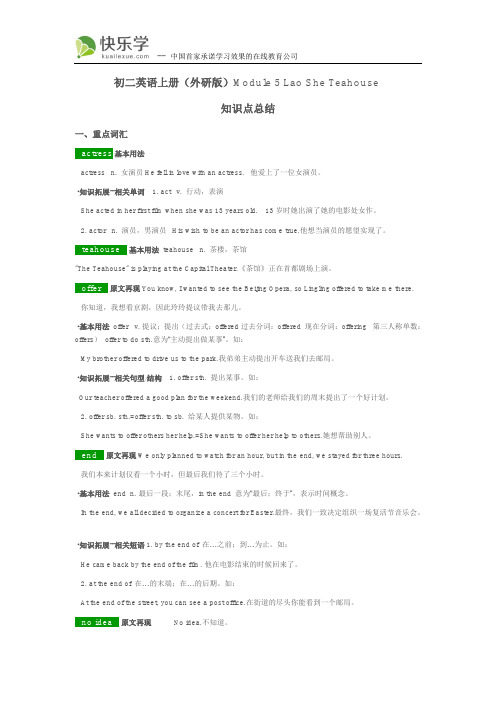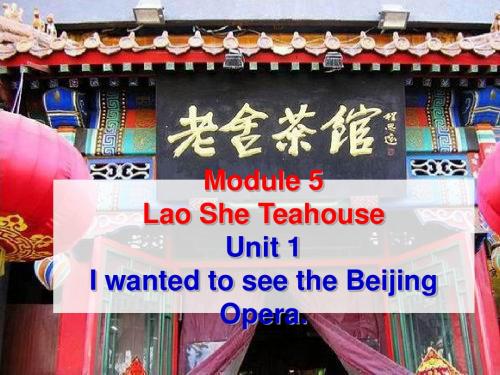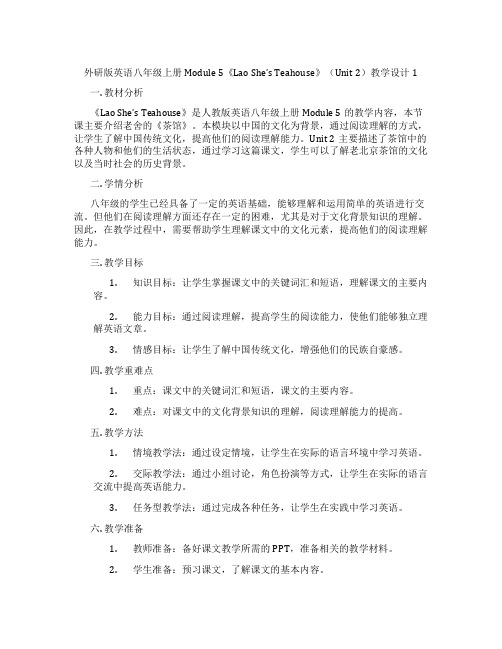2018年外研版八年级英语上册 Module 5 Lao She Teahouse模块检测题 (含答案)
新外研版八年级英语mdoule5Lao She Teahouse知识详解

初二第四讲Module5 Lao She Teahouse一.wordls单词见单词表Unit1基础知识归纳1.You know, I wanted to see the Beijing Opera, so Lingling offered to take me there.你知道,我想看京剧,所以玲玲提议带我去那里。
offer的用法:(1)offer用作名词,意为提议;提供;出价。
如:Thank you for your offer of help.感谢你主动帮忙。
(2)offer作动词,表示主动提出做某事,后接不定式,至于对方接受或采纳与否不予说明。
如:He offered to lend me his dictionary.他主动要把他的词典借给我。
(3)offer作动词,表示主动提出给与某人某物时,后面可接双宾语。
如:The headmaster offered me her raincoat.校长要把她的雨衣借给我。
(4)offer作动词,还可以表示出价。
They offered him 3,000 yuan for the motorbike.他们提出以3000元的价格买他那辆摩托车。
2.Well, it was interesting-that’s the main thing.嗯,它很有趣--那是主要的事情。
interesting意为令人感兴趣的,有趣的,可用作表语,也可以用作定语。
如:Here is an interesting family photo.这儿有一张有趣的家庭照片。
拓展:interested意为对.......感兴趣,常用于be/become interested in这一结构,其主语是人,而不是物。
它还可以用作定语,常修饰人。
如:I feel quite interested in the interesting story.我对这个有趣的故事感兴趣。
类似的形容词有:exciting(令人兴奋的),excited(感到兴奋的);surprising(令人吃惊的);surprised(感到吃惊的)3.My parents agree to on Saturday.我父母同意在周六。
英语外研八年级上册Module 5 Lao She Teahouse

课后回顾
本课时主要பைடு நூலகம்型
1) -How was it? -It was great.
2) That’s the main thing. 3) No idea. 4) You know… 5) I wanted to … 6) I hoped to …
Betty wanted to see the Beijing Opera, so Lingling (1) _o_ff_e_r_ed_ to take Betty to Lao She Teahouse.
The words of the opera were (2) __d_if_f_ic_u_ltto understand, but the actors and (3) _ac_t_re_s_s_e_s_were excellent. They only planned to watch for an hour, but in the (4)___e_n, dthey stayed for three hours. Betty thought it was interesting-that was the (5) _____mthaiinng!
language.
to learn
4. He agreed _____ (get) someone to help us.
to get
5. I told him ___n_o__t _to__p(lnaoyt play) in the
street.
6. Would you like ____t_o__co(cmome e) with me? 7. Your task is ____t_o_ f(ifnindd) the cost of
外研版八年级上Module5LaosheTeahouseunit1课文知识点练习

外研版八年级上Module5LaosheTeahouseunit1课文知识点练习外研版八年级上Module5 Laoshe Teahouse unit1课文知识点练习,随堂练习Module 5 Lao She TeahouseUnit 1外研版八年级上Module5 Laoshe Teahouse unit1课文知识点练习,随堂练习1.The girl offered me an apple .(同义句转换)The girl offered an appleto me .外研版八年级上Module5 Laoshe Teahouse unit1课文知识点练习,随堂练习2.李玲是一个好学生。
她经常主动帮助别人。
Li ling is a good student .She often offers to help others .外研版八年级上Module5 Laoshe Teahouse unit1课文知识点练习,随堂练习3.At last I worked out(解决,算出) the math problem . (改为同义句) In the end I worked out the problem .外研版八年级上Module5 Laoshe Teahouse unit1课文知识点练习,随堂练习4.街道的尽头有个邮局。
There is a post office At the end of thestreet .外研版八年级上Module5 Laoshe Teahouse unit1课文知识点练习,随堂练习5.Tony wants a job as a language teacher in China .A.to findB. findingC. find外研版八年级上Module5 Laoshe Teahouse unit1课文知识点练习,随堂练习6.My parents want me the park . A.walk B.walk C.to walk to D.walking外研版八年级上Module5 Laoshe Teahouse unit1课文知识点练习,随堂练习7. expensive for us to go to school by taxi every day . A.It’s C.They’reB.That’s D.This is外研版八年级上Module5 Laoshe Teahouse unit1课文知识点练习,随堂练习8.It’s hard an old man to remember so many new words at a time (一次,每次). A.of B.for C.on D.from外研版八年级上Module5 Laoshe Teahouse unit1课文知识点练习,随堂练习9.It’s interesting for to learn a child (learn) how to draw.外研版八年级上Module5 Laoshe Teahouse unit1课文知识点练习,随堂练习10.It’s bad for a young child not to eat (n ot eat) vegetables.外研版八年级上Module5 Laoshe Teahouse unit1课文知识点练习,随堂练习11. ---I think we should try our best to help others . ---Do you agree me ?A.toB.withC.onD.for外研版八年级上Module5 Laoshe Teahouse unit1课文知识点练习,随堂练习12.We agreed evening.A.leaving C.leavestomorrowB.to leave D.left外研版八年级上Module5 Laoshe Teahouse unit1课文知识点练习,随堂练习13.He has no idea of his own ,so he always his friends about everything . A.plays with B.argues(争吵) with C.agrees with外研版八年级上Module5 Laoshe Teahouse unit1课文知识点练习,随堂练习14.你同意他说的话吗?Do you agree said ?on。
初二英语上册(外研版)Module_5_Lao_She_Teahouse_知识点总结

初二英语上册(外研版)Module 5 Lao She Teahouse知识点总结一、重点词汇actress基本用法actress n. 女演员He fell in love with an actress. 他爱上了一位女演员。
·知识拓展--相关单词 1. act v. 行动,表演She acted in her first film when she was 13 years old. 13岁时她出演了她的电影处女作。
2. actor n. 演员,男演员 His wish to be an actor has come true.他想当演员的愿望实现了。
teahouse 基本用法teahouse n. 茶楼,茶馆"The Teahouse" is playing at the Capital Theater.《茶馆》正在首都剧场上演。
offer 原文再现You know, I wanted to see the Beijing Opera, so Lingling offered to take me there.你知道,我想看京剧,因此玲玲提议带我去那儿。
·基本用法offer v. 提议;提出(过去式:offered 过去分词:offered 现在分词:offering 第三人称单数:offers)offer to do sth.意为“主动提出做某事”。
如:My brother offered to drive us to the park.我弟弟主动提出开车送我们去邮局。
·知识拓展--相关句型/结构 1. offer sth. 提出某事。
如:Our teacher offered a good plan for the weekend.我们的老师给我们的周末提出了一个好计划。
2. offer sb. sth.=offer sth. to sb. 给某人提供某物。
外研版英语八年级上册Module 5《Lao She’s Teahouse》(Unit 1)教学设计

外研版英语八年级上册Module 5《Lao She’s Teahouse》(Unit 1)教学设计一. 教材分析《Lao She’s Teahouse》是人教版初中英语八年级上册Module 5的教学内容。
本节课主要介绍老舍的著作《茶馆》,通过学习这篇课文,学生可以了解到中国近代史上不同阶层的人物的生活状态,以及他们对待生活的态度。
教材内容丰富,涉及词汇、语法、阅读理解等多个方面,有利于提高学生的综合语言运用能力。
二. 学情分析初中八年级的学生已经具备了一定的英语基础,能够运用英语进行简单的交流。
但他们在阅读理解、词汇积累以及语法运用方面还存在一定的困难。
因此,在教学过程中,需要关注学生的个体差异,合理安排教学内容,调动学生的学习积极性,提高他们的阅读理解能力和语言运用能力。
三. 教学目标1.知识目标:学生能够掌握本节课的重点词汇和短语,如“drama, character, actor, actress, modern”等;学生能够理解课文内容,了解《茶馆》的故事背景和人物关系;学生能够运用所学的词汇和语法知识,进行简单的阅读理解和口语表达。
2.能力目标:学生能够提高阅读理解能力,通过阅读课文,获取和处理信息;学生能够在日常生活中运用所学的英语知识进行交流。
3.情感目标:学生能够培养对英语学习的兴趣,增强自信心;学生能够理解课文中所反映的社会现象,培养正确的人生观和价值观。
四. 教学重难点课文内容的理解;重点词汇和短语的掌握;运用所学的词汇和语法知识进行阅读理解和口语表达。
课文中长难句的理解;词汇的灵活运用;语法知识的运用。
五. 教学方法1.任务型教学法:通过设置各种任务,让学生在完成任务的过程中,运用所学知识,提高语言运用能力;2.情境教学法:创设各种情境,让学生在真实的语境中学习英语,提高学习兴趣;3.小组合作学习:鼓励学生相互合作,共同完成学习任务,培养团队精神;4.反馈与评价:及时给予学生反馈,鼓励他们积极参与学习,提高自信心。
外研版八年级上module_5_lao_she_teahouse_unit_1

Find out more information about theatres. Choose a scene and practise
it, then act out the scene in front of the
class next lesson.
actress the Beijing Opera
Teahouse
Lao She Teahouse
话剧《茶馆》 Lao She Teahouse
Lao She Teahouse ቤተ መጻሕፍቲ ባይዱowadays
Inside of Lao She Teahouse
Inside of the teahouse
Listen to the conversation and answer the questions.
Find these phrase in the dialogue
1.How was it? 2.You know… 3.Lingling offered to take me there. 4.It was difficult to understand the words. 5.Plan to do sth. 6. in the end 7.That’s the main thing.
你知道的 看京剧 计划干某事 主动提出带 我们去那儿 5. 以……著名 6. 希望做某事 7. 怎么样? 8. 不知道. 1. 2. 3. 4.
you know see some Beijing Opera plan to do sth. offer to take us there
be famous for=be known for hope to do sth. How was it? No idea. =I’ve no idea
外研版英语八年级上册Module 5《Lao She’s Teahouse》(Unit 2)教学设计

外研版英语八年级上册Module 5《Lao She’s Teahouse》(Unit 2)教学设计1一. 教材分析《Lao She’s Teahouse》是人教版英语八年级上册Module 5的教学内容,本节课主要介绍老舍的《茶馆》。
本模块以中国的文化为背景,通过阅读理解的方式,让学生了解中国传统文化,提高他们的阅读理解能力。
Unit 2主要描述了茶馆中的各种人物和他们的生活状态,通过学习这篇课文,学生可以了解老北京茶馆的文化以及当时社会的历史背景。
二. 学情分析八年级的学生已经具备了一定的英语基础,能够理解和运用简单的英语进行交流。
但他们在阅读理解方面还存在一定的困难,尤其是对于文化背景知识的理解。
因此,在教学过程中,需要帮助学生理解课文中的文化元素,提高他们的阅读理解能力。
三. 教学目标1.知识目标:让学生掌握课文中的关键词汇和短语,理解课文的主要内容。
2.能力目标:通过阅读理解,提高学生的阅读能力,使他们能够独立理解英语文章。
3.情感目标:让学生了解中国传统文化,增强他们的民族自豪感。
四. 教学重难点1.重点:课文中的关键词汇和短语,课文的主要内容。
2.难点:对课文中的文化背景知识的理解,阅读理解能力的提高。
五. 教学方法1.情境教学法:通过设定情境,让学生在实际的语言环境中学习英语。
2.交际教学法:通过小组讨论,角色扮演等方式,让学生在实际的语言交流中提高英语能力。
3.任务型教学法:通过完成各种任务,让学生在实践中学习英语。
六. 教学准备1.教师准备:备好课文教学所需的PPT,准备相关的教学材料。
2.学生准备:预习课文,了解课文的基本内容。
七. 教学过程1.导入(5分钟)通过展示老北京的茶馆图片,引导学生谈论他们对茶馆的了解,激发他们的学习兴趣。
2.呈现(10分钟)教师通过PPT呈现课文的主要内容,让学生初步理解课文。
3.操练(15分钟)学生分角色朗读课文,模仿课文中的人物说话,提高他们的语言表达能力。
外研版英语八年级上册Module5《LaoShe’sTeahouse》(Unit2)说课稿

外研版英语八年级上册Module 5《Lao She’s Teahouse》(Unit 2)说课稿一. 教材分析《Lao She’s Teahouse》是人教版英语八年级上册Module 5的教学内容,本节课主要通过老舍的《茶馆》这篇经典文学作品,让学生了解中国传统文化,提高学生的英语阅读能力。
本节课主要围绕着茶馆里的三个角色——王利发、刘麻子和崔久峰的故事展开,通过他们的故事,让学生了解中国近代历史和社会变迁。
二. 学情分析八年级的学生已经具备了一定的英语基础,能够进行简单的英语阅读和听说活动。
但同时,他们对于中国的传统文化和社会历史了解还不够深入,因此,在教学过程中,需要帮助学生建立起文化背景知识,提高他们的阅读理解能力。
三. 说教学目标1.知识目标:学生能够掌握课文中的关键词汇和句型,理解课文的大意。
2.能力目标:学生能够运用所学的词汇和句型进行口语表达和写作。
3.情感目标:通过学习课文,学生能够了解中国传统文化,增强民族自豪感。
四. 说教学重难点1.教学重点:课文中的关键词汇和句型,以及对中国传统文化的理解。
2.教学难点:课文中的一些历史背景和文化细节,以及如何运用所学进行口语表达和写作。
五. 说教学方法与手段1.教学方法:采用任务型教学法,让学生在完成任务的过程中,掌握课文内容,提高口语表达能力。
2.教学手段:利用多媒体课件,图片,视频等辅助教学,帮助学生更好地理解课文内容。
六. 说教学过程1.导入:通过展示茶馆的图片,引导学生谈论茶馆文化,激发学生的学习兴趣。
2.阅读理解:学生自主阅读课文,回答相关问题,教师进行讲解和指导。
3.口语表达:学生分组进行角色扮演,模仿课文中的对话,进行口语练习。
4.写作练习:学生根据课文内容,写一篇关于茶馆的小短文。
5.总结:教师对本节课的内容进行总结,强调重点和难点。
七. 说板书设计板书设计主要包括课文标题《Lao She’s Teahouse》,主要角色和他们的故事概要,以及一些关键词汇和句型。
- 1、下载文档前请自行甄别文档内容的完整性,平台不提供额外的编辑、内容补充、找答案等附加服务。
- 2、"仅部分预览"的文档,不可在线预览部分如存在完整性等问题,可反馈申请退款(可完整预览的文档不适用该条件!)。
- 3、如文档侵犯您的权益,请联系客服反馈,我们会尽快为您处理(人工客服工作时间:9:00-18:30)。
Module 5 模块过关卷时间:100分钟满分:120分听力部分(20分)Ⅰ. 关键词语选择。
(每小题1分,满分5分)1. A. end B. lend C. spend2. A. office B. offer C. officer3. A. dear B. hear C. idea4. A. twentieth B. thirtieth C. fortieth5. A. take place B. take time C. take photosⅡ. 短对话理解。
(每小题1分,满分5分)6. What does David's father do?A. B. C.7. What is Tom going to do this weekend?A. B. C.8. What's the man going to send to his brother?A. B. C.9. Where's the man's new football?A. B. C.10. What would the woman like?A. B. C.Ⅲ. 长对话理解。
(每小题1分,满分5分)11. When was Lao She born?A. In 1899.B. In 1989.C. In 1988.12. Does Lingling like Lao She's plays?A. Yes, she does.B. Yes,she is.C. No,she doesn't.13. What's Lingling's favourite play?A. The Beijing Opera.B. The True Story of Ah Q.C. Teahouse.14. What does Teahouse describe?A. The changes in Chinese society over fifty years.B. The changes in Chinese society over five hundred years.C. The changes in Chinese society over five years.15. What does Lingling think of Teahouse?A. Very interesting.B. Boring.C. Excellent.Ⅳ. 短文理解。
(每小题1分,满分5分)16. When was Lu Xun born?A. In 1882.B. In 1891.C. In 1881.17. What did Lu Xun look like?A. Thin and tall.B. Thin and short.C. Heavy and short.18. What did Lu Xun want to be when he was young?A. A writer.B. A teacher.C. A doctor.19. When did Lu Xun go to Japan to study?A. In 1912.B. In 1902.C. In 1892.20. Where did Lu Xun die?A. In Beijing.B. In Guangzhou.C. In Shanghai.笔试部分(100分)Ⅴ. 单项填空。
(每小题1分,满分15分)21. When we got to Lao She Teahouse,the waiters there gave us a warm ________.A. tripB. adviceC. welcomeD. conversation22. —Linda often ________ to help her classmates with their English.—What a kind girl!A. forgetsB. takesC. givesD. offers23. Chen Tao,can you ________the traffic accident to the policeman?A. giveB. describeC. changeD. write24. —Mum,the beautiful card I made last night is just for your ________birthday.—Oh,thank you,my dear.A. fortyB. fourteenC. fortiethD. fourteenth25. Jiefang Road is the ________street of the city,so there's often a traffic jam when people go to work or leave work.A. wideB. mainC. shortD. clean26. —Do you know about Han Hong?—Of course,she's one of ________in China.A. more famous musicianB. more famous singersC. most famous musiciansD. the most famous singers27. Three years ________ ,he ________ his hometown.A. later;returned toB. late;returnedC. after;returned toD. later;returned28. Bill and I both went to live in Guangzhou ________ the same time.A. atB. inC. byD. with29. He tried many different jobs,but ________he became a teacher.A. at the endB. to the endC. in the endD. by the end30. —I hear Jackie Chan will come to Wuhan next week.—Really?________he comes,my younger sister will be very happy.A. IfB. BeforeC. BecauseD. Till31. Wow,how nice the camera is!Please________ .A. show it meB. show me itC. show it to meD. show it to I32. My grandma wants ________ around the world. She enjoys ________ new places.A. travelling;seeingB. to travel;to seeC. to travel;seeingD. travelling;to see33. Shouguang,a small city in Weifang,Shandong Province,________ the City ofVegetables.A. namesB. namedC. is namedD. is naming34. —My parents and I will go to Xiaoping's hometown for a trip.—Really?________A. I don't think so.B. That's very strange.C. Have a good time.D. You should try it.35. —Who broke the window?—________ But it's not me.A. Good idea.B. I see.C. No idea.D. Go on.Ⅵ. 完形填空。
(每小题1. 5分,满分15分)The Beijing Opera came into being after 1790 when the famous four Anhui opera troupes (戏班) came to Beijing. Its music and singing __36__ from Xipi and Erhuang in Anhui and Hubei. Its costumes (服饰) are all beautiful and artistic. Different people wear different __37__ of clothes,dark or light,long or short. It is the highest expression (表达) of the Chinese culture. The Beijing Opera is __38__ of famous stories,beautiful paintings,and wonderful gestures (手势) and fighting. This kind of opera is very popular with __39__ people. And now more and more young people __40__ it. Many children learned to sing the Beijing Opera __41__ they were very young.Stories in the Beijing Opera are very interesting. Some of __42__ are from the history books,but most are from the literature and famous novels. The people in the story usually __43__ some disagreements (意见不一). They become __44__ and unhappy. They are sad and lonely. Sometimes they are nervous(焦虑的) and worried. Then they find a __45__ to make people happy. The stories usually end with happiness and people are all happy in the end.36. A. get B. learn C. come D. make37. A. kinds B. prices C. pieces D. lots38. A. afraid B. happy C. nice D. full39. A. American B. Chinese C. Japanese D. Australian40. A. know B. like C. see D. take41. A. after B. because C. when D. before42. A. you B. it C. us D. them43. A. have B. see C. know D. hear44. A. old B. young C. angry D. pleasant45. A. question B. way C. road D. homeⅦ. 补全对话。
